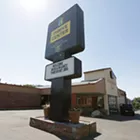Thursday, August 25, 2016
Two first-hand witnesses recall the citywide pain of the Jim West recall

Frontline photo
From left: Councilwoman Karen Stratton, former Mayor Jim West and former City Councilwoman Lois Stratton on the night of Jim West's recall.
Today, Karen Stratton is a city councilwoman, and one of the most vocal critics of Spokane Mayor David Condon and his administration. Today, Gavin Cooley is the city's chief financial officer, and one of the Condon administration's most ardent cheerleaders.
Their views diverge significantly on the recent scandal centering on how Condon and the city handled the still-unproven sexual harassment allegations against the police chief and subsequent media inquiries.
Now, there's been a recall attempt against Condon. It's no surprise that Cooley hasn't championed the recall against his boss. Yet Stratton hasn't been pushing it, either.
"Because I've lived through one, I'm probably a little less inclined to be very verbal. It's a hard process. It's hard on the family. It's hard on your staff," Stratton says. "Because I've lived through one, I don't necessarily want to be too close to the next one as it goes on. I've just chosen to stand back and — I think of Jim a lot right now."
Both Stratton and Cooley were there, knee-deep, during the 2005 recall of Mayor Jim West. They saw what it did to the city and to the mayor they both respected. They see significant differences between then and now.
Flashback to 11 years ago: It's a snowy evening on Dec. 6, 2005. Both Stratton and Cooley are in the kitchen of Stratton's mother's house, standing beside West, watching as the final nail was driven into the coffin of the mayor's political career.
Stratton stands on her heels to switch the channels on the old TV atop the fridge as the results of the recall vote come in.
"This is it," West says. His fingers drum on his coffee cup as he waits.
It's a landslide: 65 percent to 35 percent.
"I lost," West says. "Big time. That's huge. Oh. Yeah."
He winces, takes a drink and recoils as the scale of the loss sets in.
"My god, it's huge," West repeats.
Stratton's mom, Lois Stratton, a former city councilwoman who served with West in the state legislature, attempts to offer condolences: "You'll probably live longer, Jim," Stratton says. "You'll probably live longer."
West would die less than eight months later, due to complications from a cancer surgery.
But back in that kitchen, on recall night, Cooley pops open a bottle of champagne. It's not to celebrate the loss, of course, but to commemorate what had been.
West lifts his glass.
"Here's to the city of Spokane," West says, his voice cracking slightly. "You know, it's a great place. Good people. We made great progress. We had a good year and a half — two years. You know, this place deserves to be excellent."
His eyes are just a little teary.
"So do your best. Keep up the good work," West says. "And thanks for being there."
"Cheers," West's friends and co-workers mumble. Champagne glasses clink together.
City Council President Dennis Hession becomes mayor. Hession is defeated in the next election by Mary Verner. Verner, at the end of her first term, is defeated by David Condon.
Before the Spokesman-Review paper landed on porches with the headline, "West Tied to Sex Abuse in '70s, Using Office to Lure Young Men," West's term as mayor was seen as a success. "Regardless of political persuasion, that sense of optimism was shared on both the left and right," Cooley says today. "It wasn’t a Republican agenda or a Democratic agenda."
It was something palpable, something those working for the city could almost feel.
"The sense of hope and optimism when the machinery is all moving and cranking out really outstanding results for the citizens — that was happening for Jim West," Cooley says.

Frontline photo
Spokane's Chief Financial Officer Gavin Cooley opens a bottle of champagne after former Mayor Jim West's 2005 recall loss.
"Jim was almost a little bit like family," Stratton says.
Ideologically, the conservative West had little in common with the liberal Stratton. But that didn't hurt their relationship.
"We didn't agree on anything politically, but that was comfortable, because I could tell him how I felt for real," Stratton says. "And we could scream and yell."
And Stratton, who has repeatedly been critical of the way she feels the Condon administration has treated rank-and-file city workers, says that employees loved West.
She remembers him walking around City Hall talking to employees. She remembers him bringing apples for every floor on Monday, as a way to make them feel healthy.
"For the most part employees really, really respected him," Stratton says. "Employees loved him. They were sad to see him go."
But then came the headlines on May 5, 2005. Stories by Bill Morlin and Karen Dorn Steele alleged that West had been trolling gay chat sites to pick up young men, and later offered those men city internships or appointments.
In order to ensnare West, the Spokesman-Review, in a decision later debated by media ethicists, hired a consultant to pretend to be a 17-year-old boy with the screen name "Motobrock" in chat rooms on Gay.com.
West didn't try to meet up with the boy until he turned 18, but when he did, a photographer was hiding in wait, in order to confirm the mayor's identity.
Even worse were the unproven allegations swirling around. Morlin led with it:
One man, Robert J. Galliher, claims in a court deposition that Jim West molested him in the mid-1970s when he was a boy and West was a Spokane County sheriff's deputy and Boy Scout leader.The molestation claims went nowhere — West's lawyer noted that Galliher had lied when he said West had visited him in prison in 2003 — but he couldn't shake it from his image. On top of that, the FBI seized West's computer in a public corruption investigation. Ultimately, the FBI found "no indication that West had improperly assisted any potential employees or interns" and filed no charges. But by then West had already been recalled.
A second man, Michael G. Grant Jr., also accuses West of sexual abuse during the same era, including an incident at Camp Cowles, a Boy Scout camp on Diamond Lake.
As a member of West's staff, Cooley says the impact of the revelations were immediate. In an instant, the optimism and excitement of the West administration vanished.
"The wheels came off the bus instantly," Cooley says. "It was a brick wall. It literally stopped things cold."
The city still managed to grind along. Basic services were still delivered. But the wind had been knocked out of the administration.
"The machinery is designed to keep chugging along regardless of those types of circumstances," Cooley says. "But what does disappear in those situations is the innovation and the real results that inspire a community and make us stand above the average. ... This was a showstopper."
Cooley says that the Condon scandal hasn't had the same impact. Sure, it's made recruiting police chiefs more difficult. But the same devastating blow to morale hasn't happened here, Cooley says. He notes that Condon was able to get four years of success under his belt before the scandal, while West only had 17 months.
He describes the Condon scandal as more of a speed bump — an enormously frustrating one — but he says the city's good work has continued.
"We have had the same palpable sense of remarkable progress cranking out remarkable results," Cooley says.
Part of the difference, Cooley says, is that the Condon scandal has been more nuanced. There was a lot of room for debate about, for example, the public's right to know versus an employee's right to confidentiality. By contrast, the West scandal was pure cataclysm.
"There was nothing nuanced or 'hindsight-20/20' in the Jim West situation," Cooley says. "The mayor himself made no attempt to justify it."
There are a few similarities between the West scandal and Condon's. West, like Condon, blamed the media for hurting the city with its coverage.
"It's OK, to destroy me," West pleaded with then-Spokesman-Review editor-in-chief Steve Smith, "but stop destroying this city."
He threatened an invasion-of-privacy lawsuit, saying, "If the newspaper can do this to me, they can do it to anybody. They can run anybody off."
But the political and cultural contours were far different in West's case. Today, Condon's maintained support from Republicans — and painted his critics as politically motivated. The three members of the Recall David Condon PAC are all Democrats.
But back then Republicans and Democrats were united in their demand West should resign. Democrats saw a hypocrite — a closeted gay man who once voted to bar gay men from teaching in public schools. Republicans saw a creep and a pervert.
Stratton recently rewatched the hour-long Frontline documentary produced on the saga. She wonders if more tolerant attitudes today would have meant a different community reaction.
"Today, it probably wouldn't be a big deal," Stratton says about West's sexuality. "I think it was really sad that somebody had to live like that."
Stratton has been more sympathetic to West than Condon. The day the independent investigation came out accusing the Condon administration of hiding documents, Stratton opined, "For those of you that remember Mayor West, he was recalled for a lot less."
For Stratton, the West scandal felt more personal.
"I was more emotionally involved with Jim's [recall]," Stratton says. "I remember walking to lunch one day, and a citizen came up to him and said, 'You're disgusting. Why don't you go somewhere and die?' ... And he was dying of cancer."
Stratton says she didn't support the recall.
"I had too much respect for his intelligence, his honesty and his commitment to employees," Stratton says. "He hit things head on. He was a good mayor. It was sad to see that toppled in such a cruel [manner]."
To Stratton, the Condon scandal seemed more intentional.
"Jim took himself down by making a really bad decision," Stratton says. "He helped destroy himself. He didn't take employees with him."
In some ways she wonders if by asking so much of our civic leaders we drive them into making mistakes.
"You want these leaders to spend every ounce of every day of their lives being involved in serving," Stratton says. "Those are the really best leaders, that don't have a personal life. That eat sleep and drink it, and keep their finger on the pulse every waking moment. That was Jim. He didn't have a personal life. There were flaws. It happens. It was heartbreaking."
Tags: Karen Stratton , Gavin Cooley , Jim West , Scandal at City Hall , News , Image

























